General
Mak Press launches Nine Books, 40 in the Pipeline
Published
4 years agoon
By
Mak Editor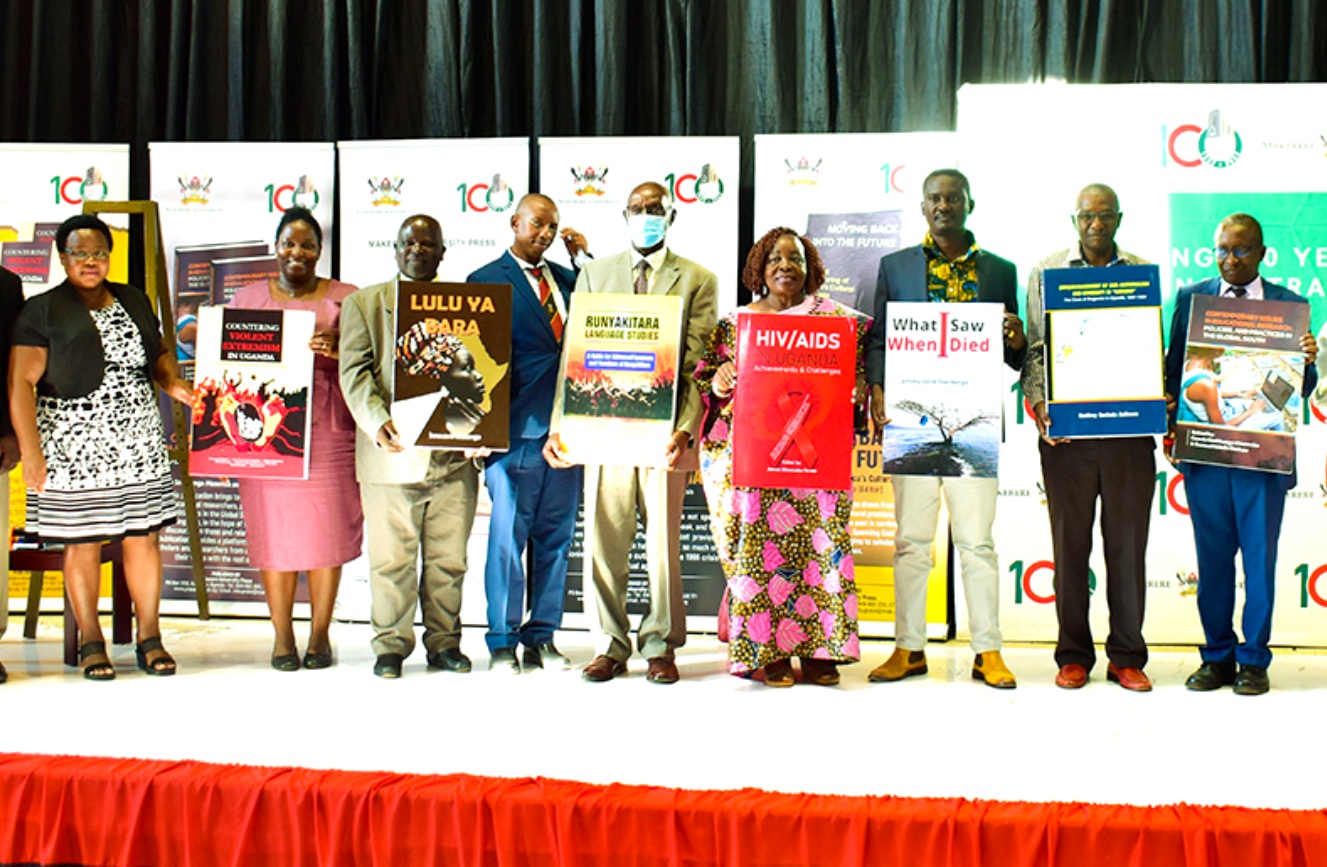
The atmosphere was festive on the warm Tuesday afternoon of 28th June 2022 as the Makerere University Press (MUP) presented its bumper harvest of nine (9) scholarly titles to the public. And, as any proud “parent” would, the Managing Editor, MUP, Dr. Samuel Siminyu took time to carefully introduce each of his “children”; the book titles and their respective authors. But first, he profusely thanked the authors for entrusting MUP with their intellectual property, an act he partly attributed to the reputation Makerere has earned itself over the century of existence.
“Makerere University Press is basing on that historic achievement to also make a name for you, for itself and for Makerere in the scholarly publishing arena” Dr. Siminyu praised. “Working with you personally has extended our circle of acquaintances and deepened our comradery” he added.
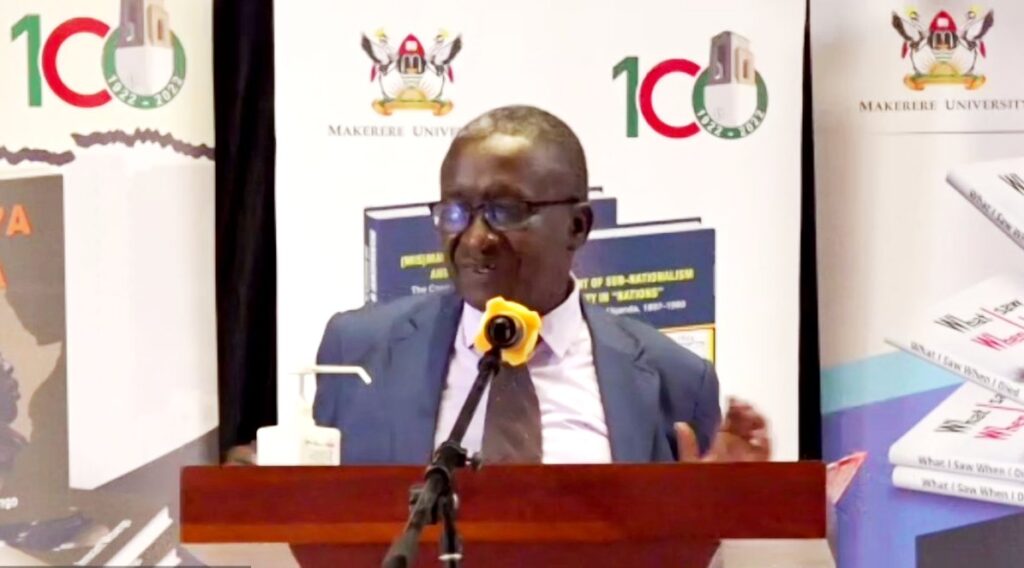
The nine books launched that afternoon were;
- Runyakitara Language Studies: A Guide for Advanced Learners and Teachers in Runyakitara edited by Oswald K. Ndoleriire,
- Contemporary Issues in Educational Research and Policy in the Global South edited by Connie Ssebbunga-Masembe and Samuel N. Siminyu,
- What I Saw When I Died by Jimmy Spire Ssentongo,
- Moving Back into the Future: Critical Recovering of Africa’s Cultural Heritage edited by Dominica Dipio,
- Countering Violent Extremism in Uganda: An Assessment of the History, Philosophies and Strategies by Veneranda Mbabazi and Others,
- Lulu ya Bara by Innocent Masengo,
- HIV/AIDS in Uganda: Achievements and Challenges edited by James Kiwanuka-Tondo,
- Statehood on Trial: Thoughts on the 1966 Uganda Political Crisis by Joseph Bossa, and
- (Mis) Management of sub-Nationalism and Diversity in “Nations”: The case of Buganda in Uganda, 1979-1980 by Godfrey Asiimwe
Author appreciation
After his brief appreciation to the hardworking Prof. Oswald Ndoleriire and his team for their book Runyakitara Language Studies: A Guide for Advanced Learners and Teachers in Runyakitara, Dr. Siminyu pondered, “if we cannot publish to promote and immortalise the study of our local languages, who will?” He was nevertheless happy to announce that relatedly, MUP had received and was processing manuscripts in and about Kiswahili, Luganda, Luo, Ateso and Lusoga.
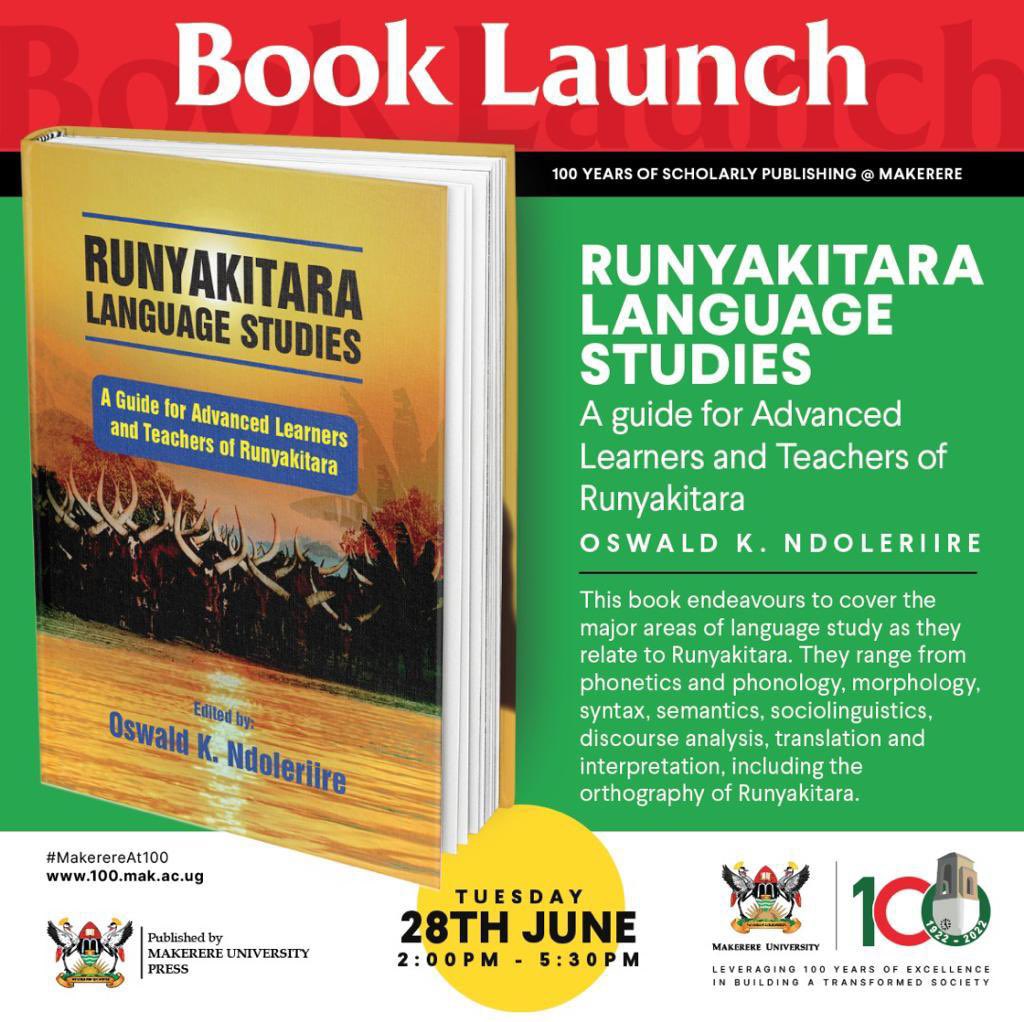
Turning to Sr. Dominica Dipio, he thanked the prolific author, filmmaker and Professor of Literature and Film for not only transferring her book Moving Back into the Future: Critical Recovering of Africa’s Cultural Heritage from an international publisher to MUP but also reminding his team of our collective obligation to reach out to the whole world with our African voice.
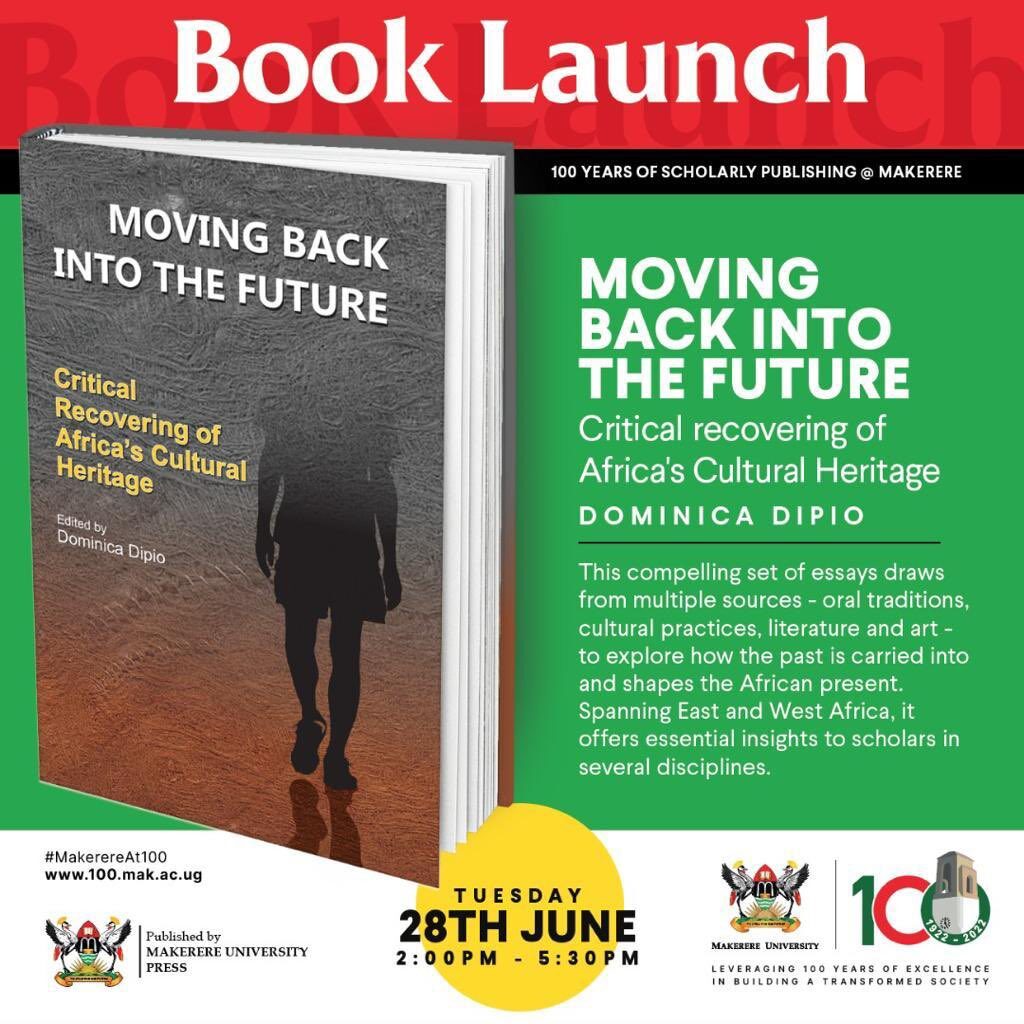
Dr. Siminyu then thanked Prof. Connie Sebbunga-Masembe for reminding us all that higher education is not just the concern of educationists at the College of Education and External Studies. Describing the book Contemporary Issues in Educational Research and Policy in the Global South as “a rich mosaic of ideas that could help propel higher education in our region to another level,” he was happy to share that it had already been warmly received and labelled by scholars of higher education as “very informative”.
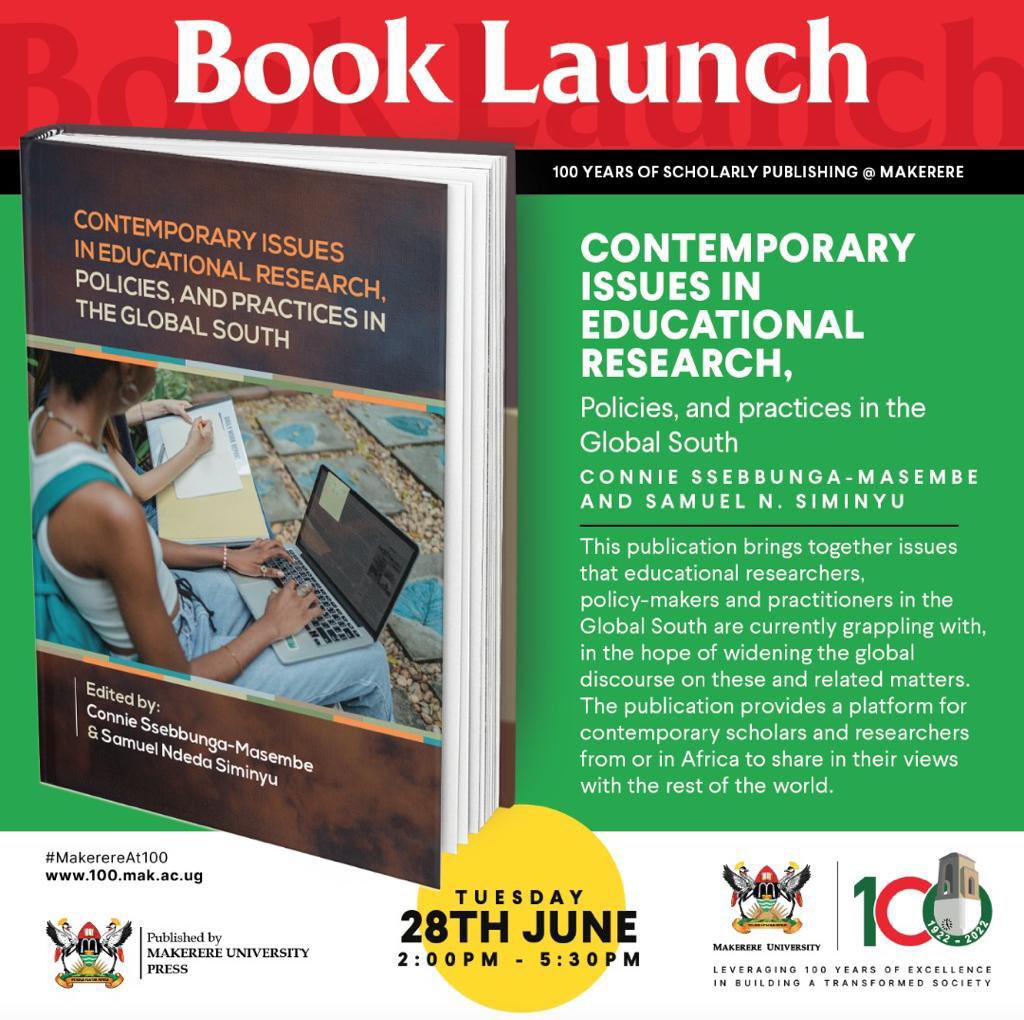
“As a public intellectual, Dr. Jimmy Spire Ssentongo endeared us to the common man on the street with his sweet satire – What I Saw When I Died. We have had to ship his popular title across the country and into neighbouring Kenya and Tanzania on taxis, buses and boda-bodas” complimented the Managing Editor.
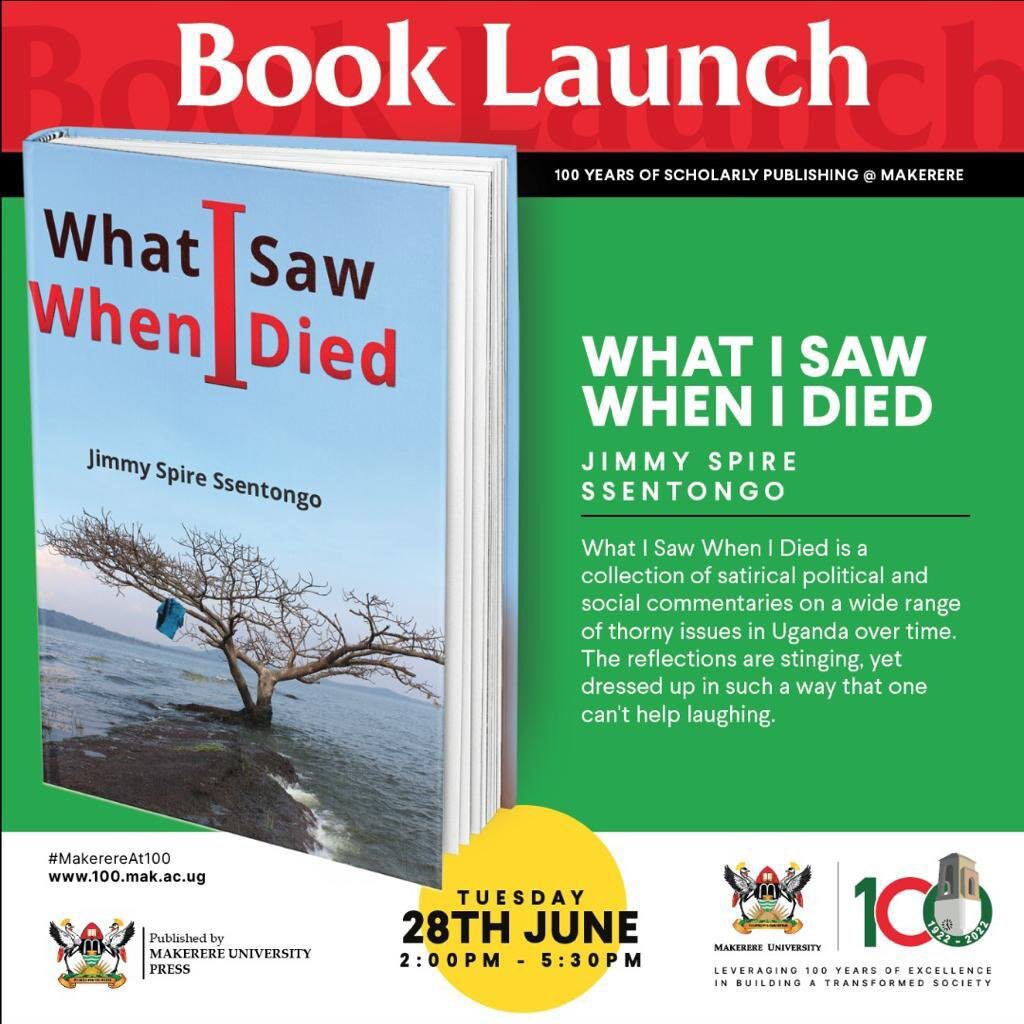
Dr. Siminyu then thanked Dr. Veneranda Mbabazi and her team for showing through their book Countering Violent Extremism in Uganda: An Assessment of the History, Philosophies and Strategies that researchers can subject even fields as intimidating as terrorism to scholarly reflection. “We hope that their findings will contribute to our understanding of and fight against terrorism.”
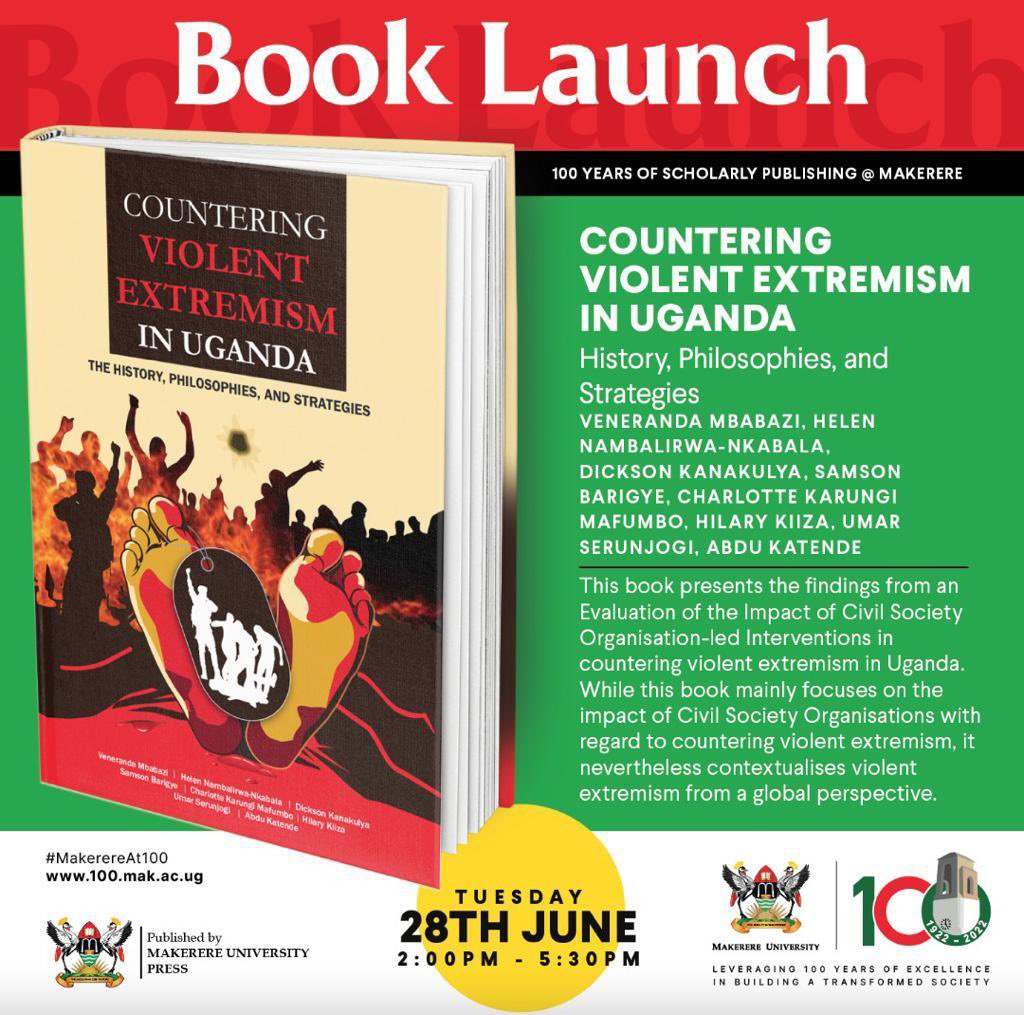
He then described working with the late Joseph Bossa on his book Statehood on Trial: Thoughts on the 1966 Uganda Political Crisis as a journey of discovery. “Can you imagine an Acting President of the former ruling party coming to see you all by himself – without a bodyguard or personal assistant?…a UPC leader who can pinpoint faults in Obote’s performance as a political leader and also see some positive traits in Yoweri Museveni’s performance?…Bossa was an enigma! He beat every stereotype and stood out as an independent thinker.”
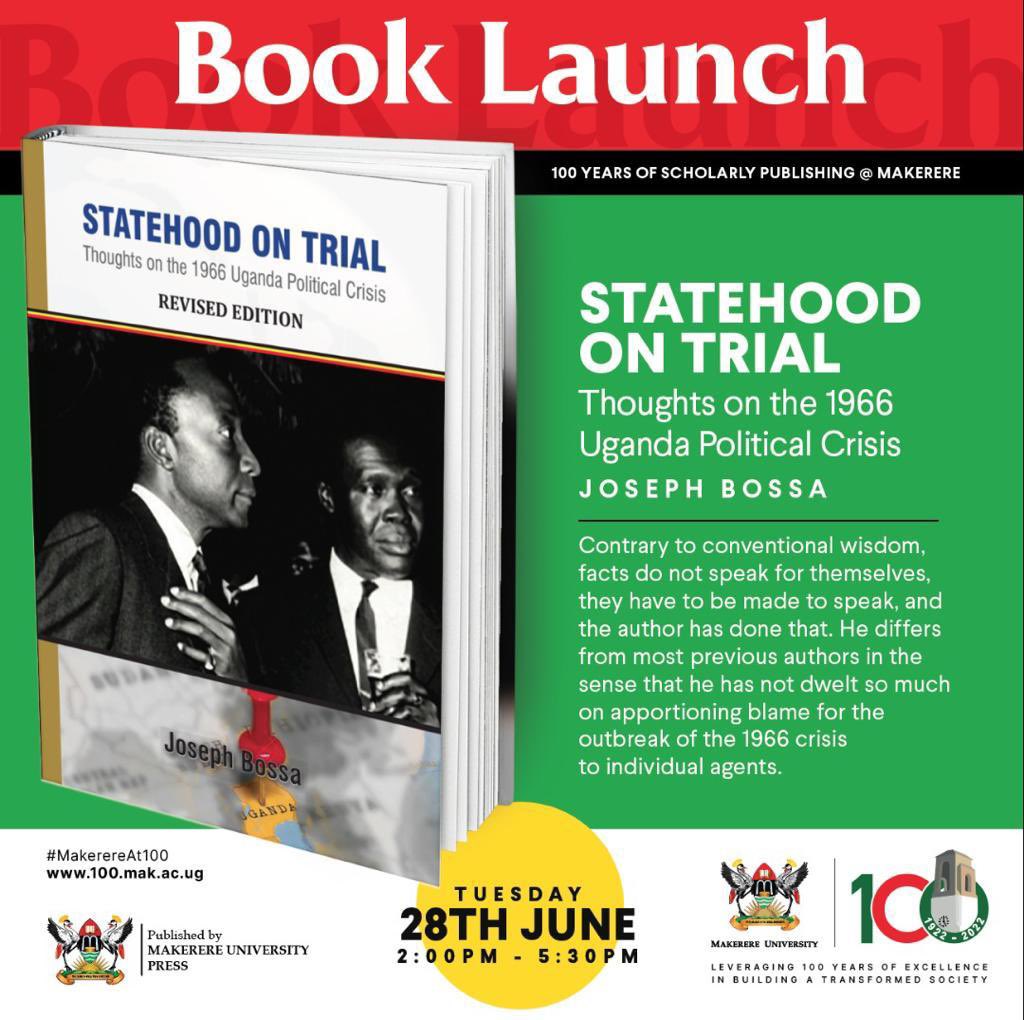
Of the next title (Mis) Management of sub-Nationalism and Diversity in “Nations”: The case of Buganda in Uganda, 1979-1980, Dr. Siminyu said, “When you read Dr. Godfrey Asiimwe’s work, you feel like telling the gentleman to stop talking and just concentrate on writing! His writing is so deep and sweet. He looks at what many other authors have already written about and comes up with fresh revelations.”
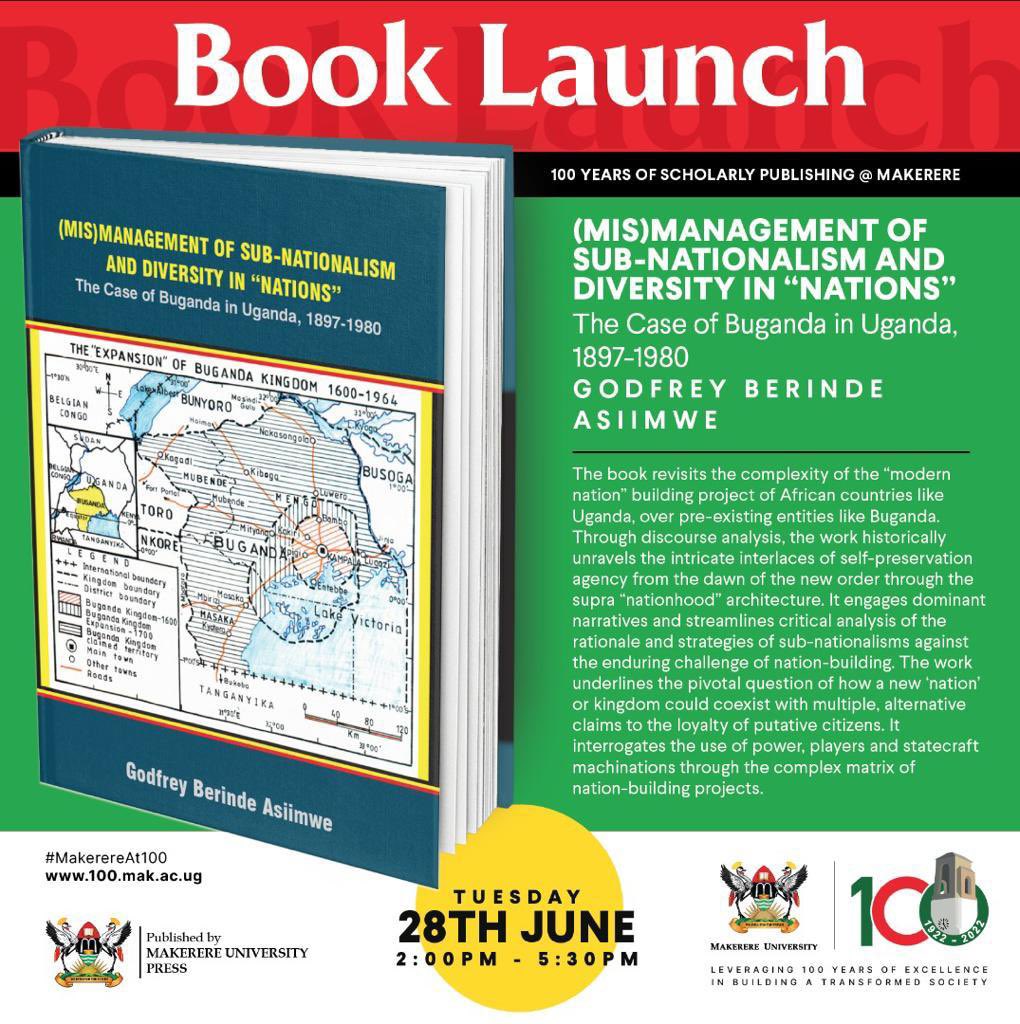
Dr. Siminyu described Prof. James Kiwanuka-Tondo’s book HIV/AIDS in Uganda: Achievements and Challenges as “another gem that was retrieved from another publisher and given to us as a statement of faith in Makerere and what it is capable of doing… Through these works, James has re-issued some pieces published in world-class journals, making them accessible and affordable for our local readers. This is a model that should be emulated.”
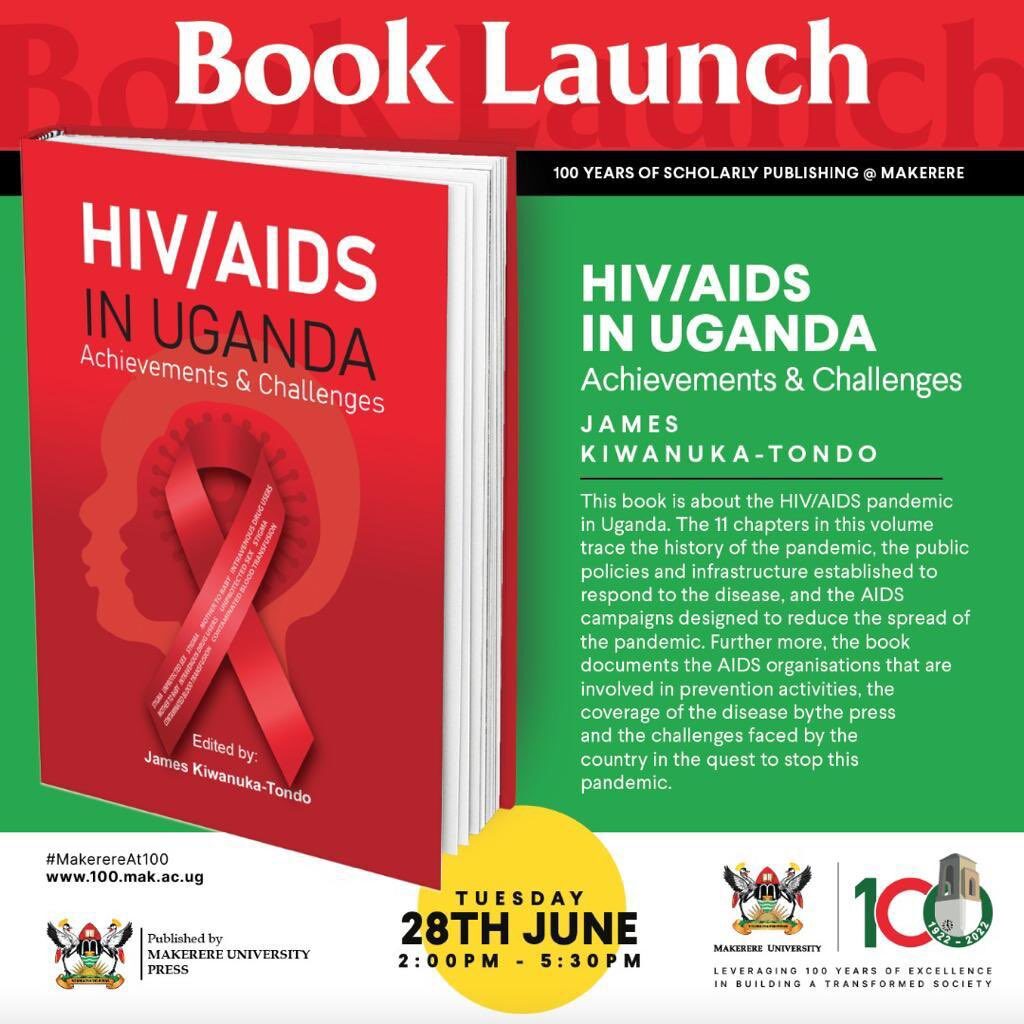
“Can you imagine a Ugandan writing Kiswahili poetry?” pondered Dr. Siminyu with reference to Dr. Innocent Masengo’s Lulu ya Bara (The Pearl of the Continent). “We are waiting to hear what our Kiswahili-speaking regional neighbours will say. They have previously alleged that Kiswahili was born in Tanzania, died in Kenya, and was buried in Uganda.” he humorously added.
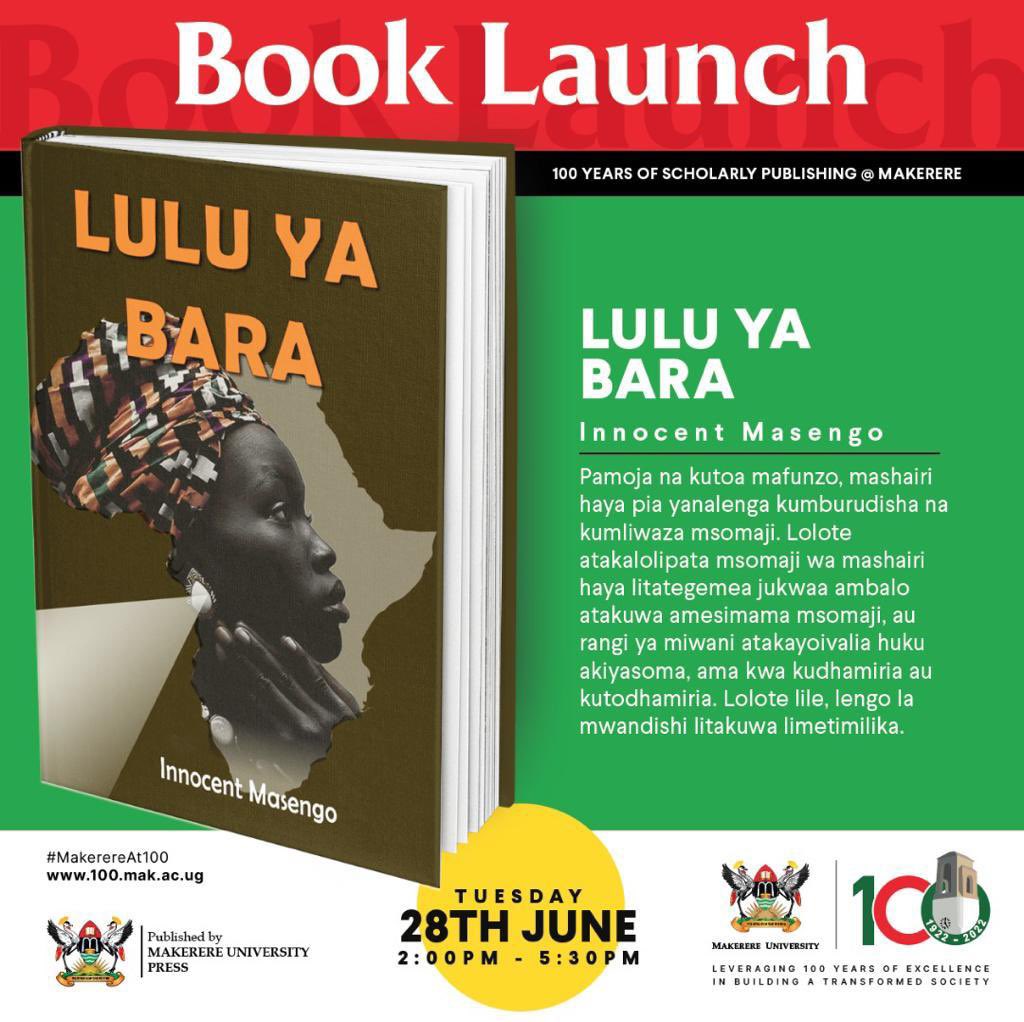
Keynote address
In line with the yearlong centenary celebrations, the Keynote address was appropriately titled “100 Years of Scholarly Publishing at Makerere“. It was delivered by Prof. J. Robert Ikoja Odongo, a gallant alumnus, former Principal of the College of Computing and Information Sciences (CoCIS), currently serving as Vice Chancellor of Soroti University. The Keynote Speaker expressed happiness at being back home, where his destiny was shaped.
From the outset, Prof. Ikoja sought to distinguish scholarly publishing from other forms of publishing such as; book publishing, trade publishing, journal publishing, newspaper publishing, magazine publishing, self-publishing and music publishing.
“Scholarly publishing is one branch of publishing that specializes in publishing for an academic and professional or scholarly market or scholarly community and the public with interest in a particular area of research” he said.
Prof. Ikoja further clarified that the outputs of scholarly publishing are researched material that are disseminated in universities, at conferences and during seminars and symposia. Post dissemination, they may be published as proceedings or in refereed journals as articles. He clarified that monographs or books belong to this category.
Chronicling the journey of publishing at over the last 100 years, Prof. Ikoja paid tribute to Sir Philip Mitchell who served as Governor of Uganda from 1935 to 1940, for championing and forecasting Makerere University to be an icon of education in the region and recommending the establishment of the Press. Subsequently, in 1945 a production unit called the Printer was established in the basement of the Main Administration Building and University Managers at the time sent one Yeko Mukasa to Britain, to be equipped with skills to run the Printer.
Following its establishment the Printer began publishing titles such as Commercial law in East Africa by John W. Katende, Medical statistics, Psychiatry, and African indigenous education by Prof. Jakayo Peter Ociti. Prof. Ikoja further cited Professors such as David Rubadiri, Margaret Donohue, George Kanyeihamba, Fredrick Kayanja, John Mbiti, Austin Bukenya, Mahmood Mamdani, Ali Mazrui and Okot p’Bitek among others who wrote and published many books and monographs.
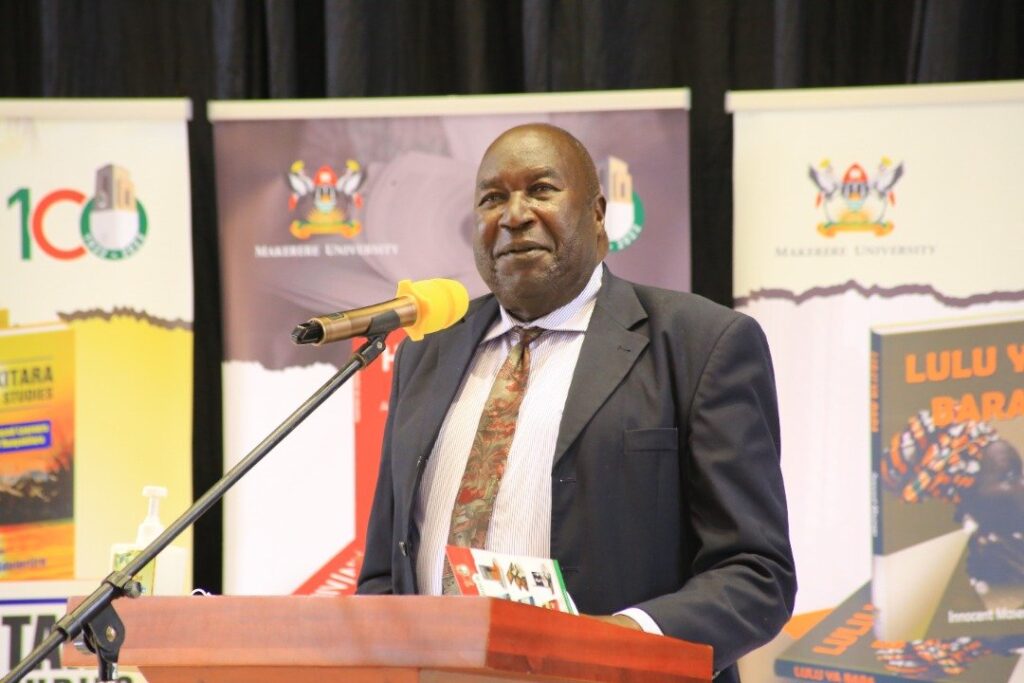
The keynote speaker elaborated that publications by Makerere researchers were done both within the University and abroad. “The reason for outside publishing was political safety in some cases, economic emancipation in some while in others, an inability of Makerere to handle their works internally and on time.”
In particular, Prof. Ikoja pointed to the period between 1940 and 1960 as one of growth of African nationalism, with Makerere becoming a hive of militant students. “African strand of students started a writing scheme from which Makerere harvested many story book manuscripts that were later published including those published under the Crow Press of the East African Literature Bureau.”
Detailing Makerere‘s history of Journals, Prof. Ikoja outlined the; Makerere Medical Journal (MMJ) 1964, Mawazo 1968, Makerere Law Journal 1975, Journal of African Religion and Philosophy 1989, East African Journal of Rural Economy, African Crop Science Journal, 1993, Dialogue 1994, African Journal of Peace and Human Rights 1995, Makerere Journal of Higher Education 1998 as evidence that Makerere had been engaged in journal publishing.
Despite this rich and vibrant history, Prof. Ikoja took issue with his Alma Mater’s limited usage of its own books and journals in teaching and research. He nevertheless called for more planning, recognition and enthusiasm to reverse the dominant use of foreign literature. He added that MUP could contribute to solving local problems by publishing well-illustrated manuals for farmers as well as artisans such as welders, builders, etc. and translating these into various local languages.
Furthermore, he called for the enactment of a publications policy to guide planning, financing, and book development among other activities and the elevation of MUP to the status Directorate. The Keynote speaker equally tasked MUP to work closely with the Directorate of Research and Graduate Training (DRGT) to scope for publishable theses or dissertations.
Prof. Ikoja challenged MUP to work together with other local, regional and international Presses such as; African Book Collective, Southern African Bibliographic Information Network (SABINET) and the Consortium of Uganda University Libraries (CUUL) to develop marketing for Makerere University imprint.
Additionally, he encouraged MUP to; consider co-publishing with Presses on other continents or partner with them to include book reviews in the lists. He reiterated the need for MUP to explore translations as a means expand their market, and take advantage of ICT for e- scholarly publications and online marketing.
Panel discussion
The keynote address was followed by a panel discussion graced by the Principal of the College of Humanities and Social Sciences (CHUSS), Prof. Josephine Ahikire and Dr. Jimmy Spire Ssentongo from the Department of Philosophy, CHUSS.
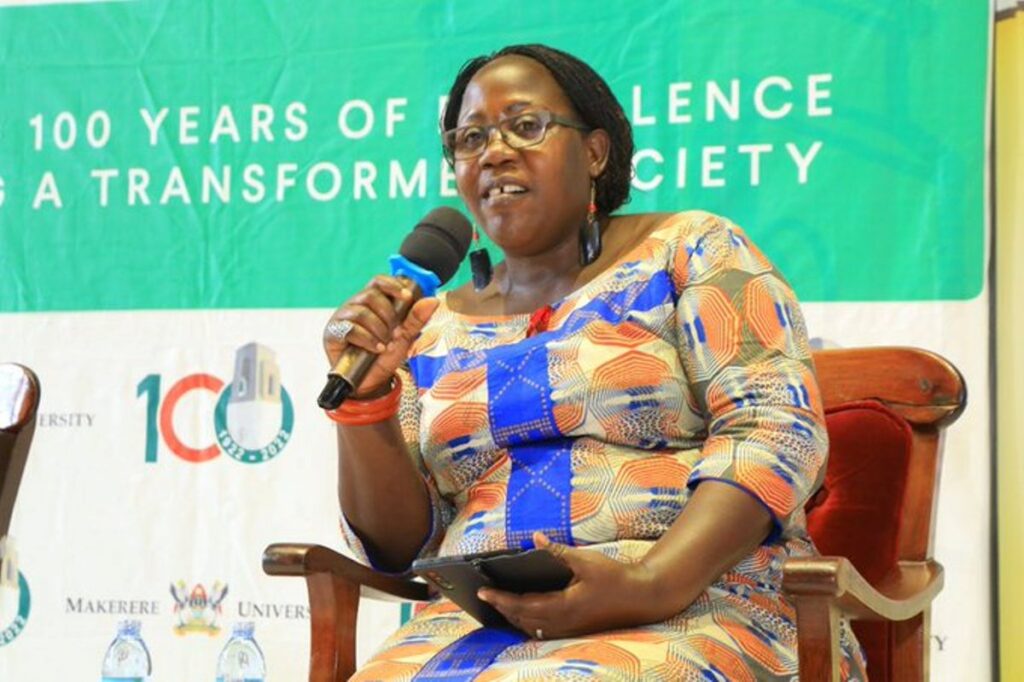
Moderated by Mr. Isaac Tibasiima from the Department of Literature, CHUSS, the panel discussion was a moment for the College to bask in the spotlight of scholarly publishing, as most of the books to be launched were authored by fellow faculty.
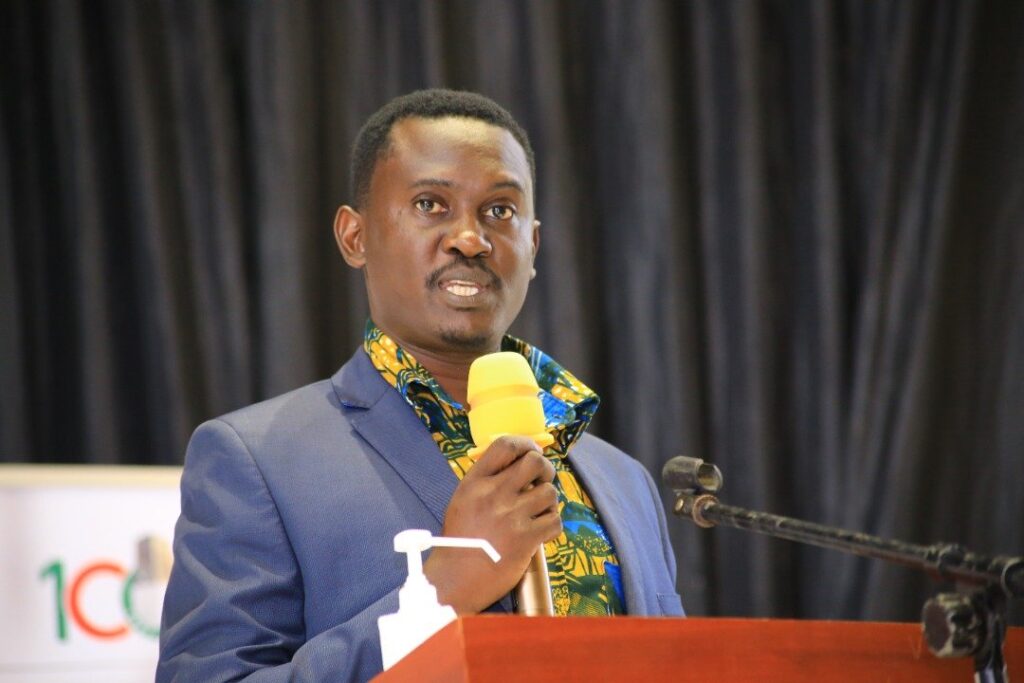
Key highlights from this session were;
- The need for Makerere to create demand for knowledge by promoting multidisciplinary publication and content that speaks to all aspects of our human nature, be they spiritual, material, social, philosophical etc.
- Writers ought to go beyond simply paying attention to producing new knowledge to caring about who is actually reading and making use of it. Academics should also never shy away from promoting their own works
- The need to examine how favourable our scholar incentive structure is to the book writing and how policies on promotion have contributed to or disincentivised the same.
- The need to decolonise publication and knowledge production in our promotion processes. Unwarranted extra scrutiny of articles published in local journals during promotion processes pushes authors to publish in international ones that don’t attract as much scrutiny.
- The need to promote writing in our local languages as a political act. Furthermore, there is need include more of our writers in teaching and research course content as a way of motivating the younger generation to write and expand knowledge in our context
- The culture of always seeking to go beyond the comforts of what we have achieved, what we know and what is celebrated by our society and peers as true success should be strongly encouraged.
- It is our responsibility as inheritors to grow the body of knowledge beyond what already exists
Concluding remarks
The Deputy Vice Chancellor (Academic Affairs) and Chairperson of the MUP Editorial Board, Prof. Umar Kakumba in his remarks sincerely appreciated the authors for having faith in the Press to publish their work. “I am also delighted to note that we have over 40 manuscripts in the pipeline under the Makerere University Press, which is a great sign of confidence in this institution.”
He appreciated the Vice Chancellor for entrusting him and the MUP Editorial Board and staff with the responsibility to promote scholarly publishing. The MUP mandate, he said, is in line with the core thrust of the Makerere Strategic Plan to make the University research-led.
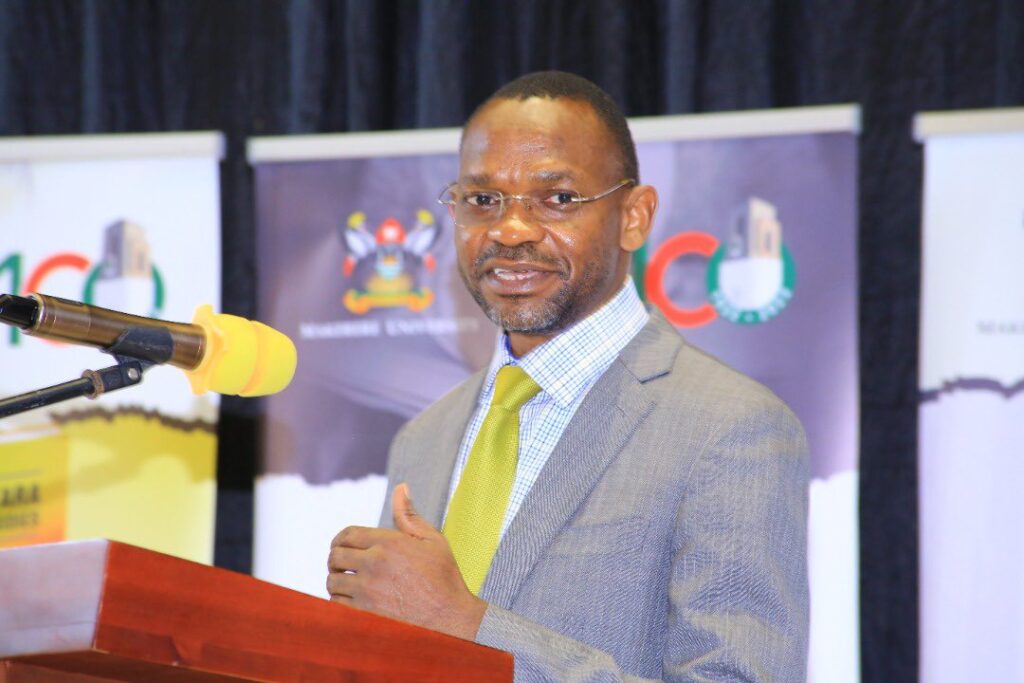
Prof. Kakumba further noted that the cost recovery model employed by MUP unlike the return on investment model employed by other publishing houses would ensure that authors’ publications hit the market at a competitive cost, which will enable more people to purchase and read their works.
Prior to inviting the Chief Guest to officially launch the books, the Vice Chancellor, Prof. Barnabas Nawangwe expressed great pride at being at the helm of Makerere at a time when the University is progressing towards its goal of being a vibrant research university. He congratulated the authors upon investing time and energy in scholarly publishing and being good role models for other staff.
“My main objective as Vice Chancellor is the emancipation of our people from mental slavery. And so it makes me very happy to see authors beginning to publish about the issues that affect Uganda and Africa” remarked Prof. Nawangwe. He congratulated Prof. Kakumba and the Editorial Board as well as Dr. Siminyu and the MUP staff upon this achievement.
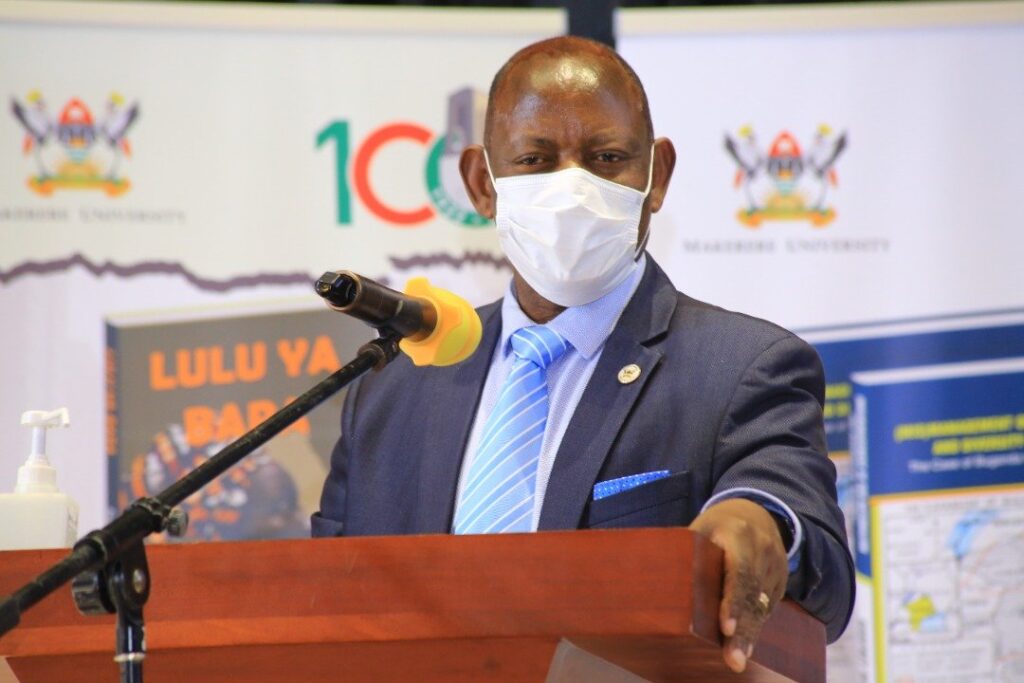
Prof. Nawangwe challenged the younger generation in the room to always remember that their continent and its people are marginalised. He added that it is the responsibility of youth to fight and overcome the present state of affairs.
The Chief Guest at the Book Launch was the Minister of Science, Technology and Innovation, Hon. Dr. Monica Musenero, who was represented by Dr. Cosmas Mwikirize, Member of Staff at the College of Engineering, Design, Art and Technology (CEDAT) currently serving as the Ministry’s Leader of the Engineering Economy.
Commending the scholars on their impressive publications, the Minister nevertheless warned that the race is far from over if this knowledge does not add value to society, make peoples’ lives better, create a conscious and transformed society, as well as contribute to reorientation of mindsets, value systems and policy.
Hon. Dr. Musenero nevertheless commended Makerere University for establishing a viable Press, which will serve as an example to other Ugandan Universities. “We are proud of the quality of publications that we have witnessed today and we encourage you to do more; it is important that we strive to maintain international quality standards in our scholarly publications.”
Furthermore, she challenged the University to ensure that most of her publications are availed electronically. “A small spark can light a fire and cause conflagration capable of consuming forests of intellectual ignorance. Today, electronic media are the chief enablers of this conflagration.”
Hon. Dr. Musenero concluded by thanking the Vice Chancellor and University Management for nurturing and supporting the spirit of innovation. She expressed the Government’s anticipation to seeing more publications in varied disciplines as well as from beyond the gates of Makerere.
Upon officially launching the nine (9) books, Dr. Mwikirize accompanied by the Vice Chancellor and Members of Management autographed dummies of the books and had a photo moment with the authors and their families. Mr. Tibasiima, assisted by the Principal Public Relations Officer (PRO), Ms. Ritah Namisango moderated the days proceedings.
You may like
-


Celebrating Academic Excellence: CoBAMS Presents 975 Graduands at Mak 76th Graduation Ceremony
-


Mak 76th Graduation Ceremony: CoNAS Presents 16 PhDs & Best Performing Male Student in the Sciences
-


Medical graduates urged to uphold Ethical values
-


CAES Presents Overall Best Performing Student in the Sciences & a Record 28 PhDs at the 76th Graduation Ceremony
-


Graduation marks the next phase of accountability, graduates told
-


Over 9,200 to graduate at Makerere University’s 76th Graduation

It is with great pleasure that I welcome you to this edition of Mak News Magazine, a publication that continues to chronicle Makerere University’s journey as a centre of academic excellence, innovation, and societal transformation.
The stories featured in this issue vividly demonstrate Makerere’s unwavering commitment to addressing national, regional, and global challenges through research, partnerships, and people-centred solutions. They reflect a university that is deeply engaged with society, one that applies knowledge not only to advance scholarship, but also to improve lives.
A recurring theme in this edition is innovation for resilience and inclusion. From the College of Agricultural and Environmental Sciences’ Healthy Soy Initiative combating child malnutrition amid climate change, to the cutting-edge work of CEDAT’s Team Green Minds integrating IoT into agriculture, Makerere continues to harness science and technology to respond to pressing development needs. Equally inspiring is the College of Natural Sciences’ success in securing international funding to scale up fish processing technologies, with a deliberate focus on empowering women and strengthening livelihoods.
This issue also highlights Makerere’s growing role in advancing health and wellbeing. The launch of the Early Intervention Psychiatry Services Clinic at Makerere University Hospital marks an important step in strengthening mental health services, while the Hospital’s transformation from a modest sickbay into a centre of excellence stands as a testament to decades of strategic investment, dedication, and service to the nation.
Our commitment to education access and global engagement is equally evident. Strategic partnerships, such as that between the College of Education and External Studies and the Uganda Vocational and Technical Assessment Board, are expanding pathways to quality education. The establishment of the first-ever United States Studies Centre in the Great Lakes Region positions Makerere as a hub for dialogue, research, and policy engagement on global affairs. We also celebrate our vibrant international community, with graduates drawn from 67 nationalities—affirming Makerere’s status as a truly global university.
This edition further showcases initiatives that ensure long-term institutional sustainability, including the launch of the CoCIS Endowment Fund, infrastructure developments such as the modern hostel at Buyana Farm, and transformative programmes supported by the Mastercard Foundation that continue to empower young people across the continent.
As you read through these pages, I invite you to reflect on the collective effort of our students, staff, alumni, partners, and supporters whose contributions make these achievements possible. Together, we continue to shape Makerere University as a place where knowledge serves humanity.
I wish you an engaging and inspiring read.
Prof. Barnabas Nawangwe
VICE CHANCELLOR

The Board Chairperson of the Makerere University Endowment Fund (MakEF), Dr. Margaret Blick Kigozi, has urged graduands in Health and Life Sciences to uphold professional ethics and serve humanity with diligence and compassion.
Her appeal came during the passing out of graduates from the College of Natural Sciences (CoNAS), the College of Veterinary Medicine, Animal Resources and Bio-Security (CoVAB), the College of Health Sciences (CHS) and the School of Public Health (SPH) on Day Two of the 76th Graduation Ceremony of Makerere University.
“Class of 2026, you are now part of the Makerere legacy. Wherever you go clinics, laboratories, farms, boardrooms, or classrooms, you carry this institution with you. Serve your patients with skill and compassion. Care for animals and communities responsibly. Question boldly and keep learning,” Dr Kigozi, said.
Delivering the commencement address, Dr. Kigozi lauded the graduates for their dedication to careers that directly impact lives and communities. She encouraged them to use their knowledge generously and exercise their power gently.
“Your education has trained you to ask better questions. Your humanity must guide the answers. Never forget that behind every chart, every case, every animal, every experiment, there is life. And life deserves care, patience, and dignity. Give every person you come in contact with care, patience and dignity,” Dr Kigozi, noted.
As the graduates embark on their professional journeys, Dr. Kigozi emphasized the importance of cultivating basic business acumen and financial literacy to ensure sustainability in their work.

“You do not need to become accountants but you must be able to read the essentials: understand simple financial statements, budgets and key metrics so you can judge whether a clinic, lab, or program is sustainable. You are encouraged to start your business. There are numerous investment opportunities in your areas of training. You can provide services to our people and create jobs,” Dr Kigozi, said.
She shared candidly how, when she first stepped into leadership, she realised she did not understand balance sheets or budgets well enough. So, she returned to Makerere for short courses to strengthen herself.
“A well-run Hospital, clinic or lab delivers better outcomes, attracts staff, and secures funding. Business savvy is not only about profit, it’s about sustainability and the freedom to serve ethically and effectively. Carry clinical skill with business sense so your work endures and grows,” Dr. Kigozi, noted.
Quoting renowned writer and producer Shonda Rhimes, creator of Grey’s Anatomy, who once reflected that succeeding in one area of life can sometimes mean falling short in another, Dr. Kigozi encouraged women graduates to intentionally balance professional ambition with family responsibilities.
“When one area thrives, another is often under strain. When Navio was graduating from school I had to manage the Presidential Investor Round Table on the same day as Executive Director Uganda Investment Authority. I chose my job and delegated his siblings to attend Navios graduation. I learnt from this. I choose family always after that thing you achieve once and keep forever,” Dr Kigozi, said.
In his speech, the Prof Barnabas Nawangwe, the Vice Chancellor, informed the congregation that Makerere’s ranking on all university ranking platforms has remained stable, placing Makerere among the top 10 African universities and within the top 4.5% globally.
“In the Times Higher Education global ranking, Makerere University made a formidable jump from the 1200-1500 bracket to the 800-1000 bracket. This was no mean achievement and I congratulate all members of the Makerere Community on this stellar performance,” Prof Nawangwe, said.
General
Graduation marks the next phase of accountability, graduates told
Published
3 days agoon
February 25, 2026
“A degree is not a finish line. Graduation is not the end of learning, It is the beginning of accountability,” Prof. Nicholas Ozor, the Executive Director of the African Technology Policy Studies Network Nairobi, Kenya (ATPS), said.
Delivering a keynote address under the theme ‘Knowledge with purpose’, during Makerere University’s 76th graduation ceremony on Tuesday 24th February, Prof Ozor, challenged graduates to see their degrees not as status symbols, but as instruments of responsibility.
In his speech, he painted a candid picture of the world the graduates are stepping into, one marked by climate change, technological disruption, inequality, food insecurity and the rapid spread of misinformation. Yet rather than framing these challenges as obstacles, he described them as opportunities for purposeful leadership.
“Into this world, you step, armed with knowledge, credentials, and potential. Your degrees do not make you better than others. They make you responsible for others,” Prof Ozor, said.
Addressing graduands from College of Agricultural and Environmental Sciences (CAES)
College of Computing and Information Sciences (CoCIS), College of Education and External Studies (CEES) and School of Law (SoL), Prof. Ozor tailored his message to each field of study.
To graduates of the School of Law, he described the legal profession as a moral calling, urging them to use the law to protect the vulnerable and uphold justice with courage.
“Uganda, Africa, and the world do not need lawyers who only know how to argue. They need lawyers who know why they argue. Use the law to protect the weak, not intimidate them. Use your knowledge to defend justice, not delay it. Let integrity define your reputation not merely your résumé,” Prof Ozor, said.
For graduands who might feel that shortcuts will be tempting and silence will feel safer than truth, Prof. Ozor reminded them that justice does not need clever people, but courageous ones.
To the College of Education and External Studies, he underscored the transformative power of teachers, reminding them that classrooms shape nations long before policies do.
“Every nation rises and falls on the quality of its teachers. Never underestimate the power of a classroom. Teach not only for examinations, but for understanding. Teach not only content, but character. Teach learners how to think not what to think. Education is quiet work but its impact echoes across generations,” Prof Ozor, noted.
He called upon graduands from the College of Computing and Information Sciences, to use technology to solve African problems, not merely to imitate foreign solutions.
“Technology is powerful, but it is not neutral. Every line of code carries values. Every system you design affects real lives. Build for inclusion. Build for accessibility. Build for truth. Do not let innovation outrun ethics. The future will not belong to those who know the most technology, but to those who use it wisely,” He noted.
During the ceremony, Prof Ozor announced that the African Technology Policy Studies Network is offering PhD scholarships and postdoctoral fellowships in Artificial Intelligence, inviting deeper collaboration with Makerere.
For graduates of the College of Agricultural and Environmental Sciences, he highlighted their critical role at the intersection of sustainability and survival, calling on them to blend indigenous knowledge with scientific innovation to secure Africa’s food systems and protect its ecosystems.
In closing, he reminded graduands that their integrity will open doors their degrees cannot, their humility will teach them lessons success never will, and their resilience will matter more than their grades.
Five principles to be remembered:
- Embrace lifelong learning. The world changes too fast for static knowledge.
- Choose purpose over comfort. Impact matters more than income.
- Build character before career. Skills get you hired; character sustains you.
- Serve something larger than yourself. Give back to your communities and your country.
- Believe in Africa, and act. Do not wait for solutions from elsewhere. Be the solution.
Trending
-

 Humanities & Social Sciences5 days ago
Humanities & Social Sciences5 days agoMeet Najjuka Whitney, The Girl Who Missed Law and Found Her Voice
-

 Health1 week ago
Health1 week agoUganda has until 2030 to end Open Defecation as Ntaro’s PhD Examines Kabale’s Progress
-

 Agriculture & Environment1 week ago
Agriculture & Environment1 week agoUganda Martyrs Namugongo Students Turn Organic Waste into Soap in an Innovative School Project on Sustainable Waste Management
-

 General4 days ago
General4 days ago76th Graduation Highlights
-

 General1 week ago
General1 week agoMastercard Foundation Scholars embrace and honour their rich cultural diversity
